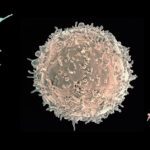Présentation
VENDREDI 23 SEPTEMBRE 2016 – 12 heures 00
Salle Jules Bordet – Bâtiment Metchnikoff – RDC
iRhoms: Key Regulators of ADAM17-Dependent TNF-alpha and EGFR Signaling
Carl Blobel
Hospital for Special Surgery, New York, Etats-unis
Invité par : Lucie Peduto poste 94 27
The Blobel lab is focused on elucidating the function of cell surface metalloproteinases termed ADAMs (a disintegrin and metalloproteinase) in development and disease. ADAMs have emerged as critical modulators of cell-cell interactions through their ability to regulate the bioavailability of membrane proteins such as the pro-inflammatory cytokine TNFa and ligands of the EGF-receptor (EGFR). Moreover, ADAMs are essential for activating cell surface receptors of the Notch family, which control cell fate decisions during the development of specialized cell types in different tissues, but are also involved in the pathogenesis of cancer. Studies in the lab employ a comprehensive combination of biochemical and cell biological approaches as well as mouse models for disease. They have helped establish ADAM17 as a key regulator of the EGFR signaling pathway, which is essential for maintaining the skin and intestinal barrier, but can cause a variety of human pathologies when it is dysregulated. Moreover, the Blobel lab has pioneered studies on the newly discovered iRhom1 and 2 as crucial upstream regulators of ADAM17-dependent EGFR and TNFa-signaling. The medical relevance of this work is high, since it not only helps understand how exactly iRhoms and ADAM17 can promote EGFR-dependent pathologies such as cancer and TNFa-dependent autoimmune disorders such as rheumatoid arthritis, but it has also revealed new and attractive potential targets for treatment of these diseases.


